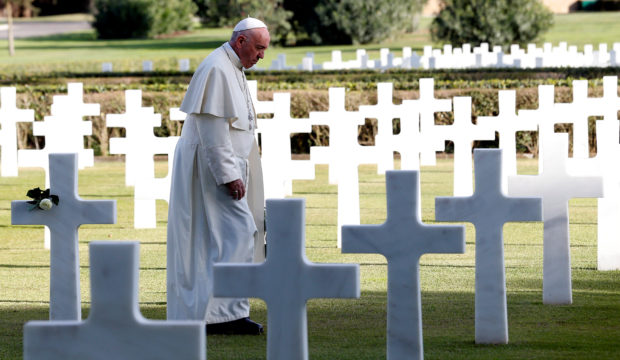
Pope Francis passes graves, before a Mass at the U.S. World War II cemetery on the day Christians around the world commemorate their dead, in Nettuno, near Rome, Italy, November 2, 2017. REUTERS/Stefano Rellandini
ROME — Pope Francis, in a visit to a military cemetery on the day Catholics remember their dead, on Tuesday urged arms manufacturers to “stop” because war “swallows up the children of the homeland.”
On All Souls Day, the Pope said a Mass at the French military cemetery in Rome, burial place of about 1,900 French and Moroccan soldiers killed in World War II.
Pope Francis, who visits a cemetery each year on the day of remembrance, laid white roses and stopped to pray at some of the tombs and mentioned that one read “Unknown, Died for France, 1944.”
“Not even a name. But in the heart of God, there are all our names. This is the tragedy of war,” he said in an improvised sermon.
“But … do we fight enough so that there are no wars, so that there are no economies of countries that are strengthened by the weapons industry?” he said.
“These tombs are a message of peace. Stop brothers and sisters, stop. Stop, arms manufacturers, stop!” he said, calling those buried at the cemetery among the many “victims of war, which swallows up the children of the homeland.”
Pope Francis has made many calls for disarmament and has said that nuclear weapons should be banned because even their possession for deterrent reasons is “perverse” and indefensible.
When the location of the Mass was announced last month, an Italian group protested, saying the choice was an offense to victims of Moroccan soldiers, known as Goumiers, who committed many random murders and raped many Italian women in the countryside between Naples and Rome as allied forces moved up the Italian peninsula.
One such incident was immortalized in the 1960 neo-realist film by Vittorio De Sica “Two Women,” starring Sophia Loren, which told the story of a woman and her daughter who were both raped by Moroccan soldiers south of Rome.